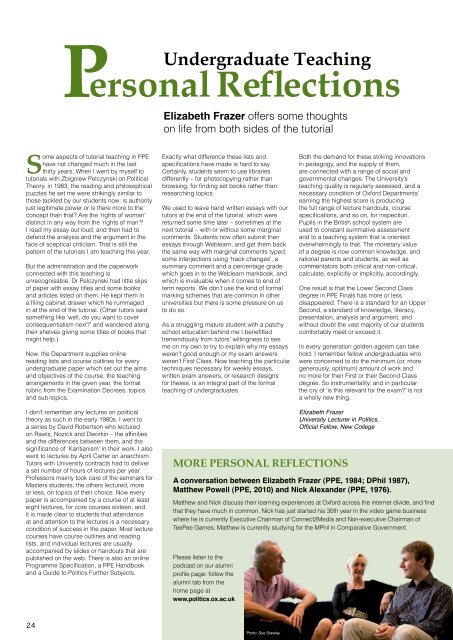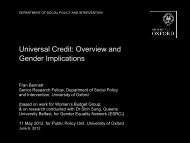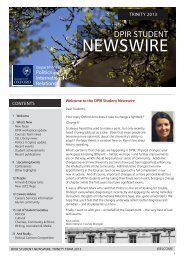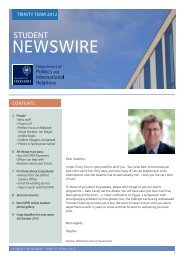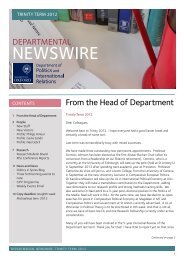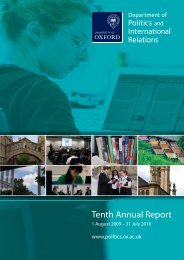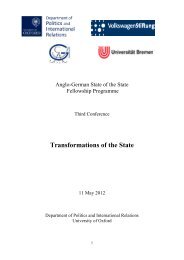Inspires - Department of Politics and International Relations ...
Inspires - Department of Politics and International Relations ...
Inspires - Department of Politics and International Relations ...
- No tags were found...
You also want an ePaper? Increase the reach of your titles
YUMPU automatically turns print PDFs into web optimized ePapers that Google loves.
PUndergraduate Teachingersonal ReflectionsElizabeth Frazer <strong>of</strong>fers some thoughtson life from both sides <strong>of</strong> the tutorialSome aspects <strong>of</strong> tutorial teaching in PPEhave not changed much in the lastthirty years. When I went by myself totutorials with Zbigniew Pelczynski on PoliticalTheory, in 1983, the reading <strong>and</strong> philosophicalpuzzles he set me were strikingly similar tothose tackled by our students now: is authorityjust legitimate power or is there more to theconcept than that? Are the ‘rights <strong>of</strong> woman’distinct in any way from the ‘rights <strong>of</strong> man’?I read my essay out loud, <strong>and</strong> then had todefend the analysis <strong>and</strong> the argument in theface <strong>of</strong> sceptical criticism. That is still thepattern <strong>of</strong> the tutorials I am teaching this year.But the administration <strong>and</strong> the paperworkconnected with this teaching isunrecognisable. Dr Pelczynski had little slips<strong>of</strong> paper with essay titles <strong>and</strong> some books<strong>and</strong> articles listed on them. He kept them ina filing cabinet drawer which he rummagedin at the end <strong>of</strong> the tutorial. (Other tutors saidsomething like ‘well, do you want to coverconsequentialism next?’ <strong>and</strong> w<strong>and</strong>ered alongtheir shelves giving some titles <strong>of</strong> books thatmight help.)Now, the <strong>Department</strong> supplies onlinereading lists <strong>and</strong> course outlines for everyundergraduate paper which set out the aims<strong>and</strong> objectives <strong>of</strong> the course, the teachingarrangements in the given year, the formalrubric from the Examination Decrees, topics<strong>and</strong> sub-topics.Exactly what difference these lists <strong>and</strong>specifications have made is hard to say.Certainly, students seem to use librariesdifferently – for photocopying rather thanbrowsing, for finding set books rather thanresearching topics.We used to leave h<strong>and</strong> written essays with ourtutors at the end <strong>of</strong> the tutorial, which werereturned some time later – sometimes at thenext tutorial – with or without some marginalcomments. Students now <strong>of</strong>ten submit theiressays through Weblearn, <strong>and</strong> get them backthe same way with marginal comments typed,some interjections using ‘track changes’, asummary comment <strong>and</strong> a percentage gradewhich goes in to the Weblearn markbook, <strong>and</strong>which is invaluable when it comes to end <strong>of</strong>term reports. We don’t use the kind <strong>of</strong> formalmarking schemes that are common in otheruniversities but there is some pressure on usto do so.As a struggling mature student with a patchyschool education behind me I benefittedtremendously from tutors’ willingness to seeme on my own to try to explain why my essaysweren’t good enough or my exam answersweren’t First Class. Now teaching the particulartechniques necessary for weekly essays,written exam answers, or research designsfor theses, is an integral part <strong>of</strong> the formalteaching <strong>of</strong> undergraduates.Both the dem<strong>and</strong> for these striking innovationsin pedagogy, <strong>and</strong> the supply <strong>of</strong> them,are connected with a range <strong>of</strong> social <strong>and</strong>governmental changes. The University’steaching quality is regularly assessed, <strong>and</strong> anecessary condition <strong>of</strong> Oxford <strong>Department</strong>s’earning the highest score is producingthe full range <strong>of</strong> lecture h<strong>and</strong>outs, coursespecifications, <strong>and</strong> so on, for inspection.Pupils in the British school system areused to constant summative assessment<strong>and</strong> to a teaching system that is orientedoverwhelmingly to that. The monetary value<strong>of</strong> a degree is now common knowledge, <strong>and</strong>rational parents <strong>and</strong> students, as well ascommentators both critical <strong>and</strong> non-critical,calculate, explicitly or implicitly, accordingly.One result is that the Lower Second Classdegree in PPE Finals has more or lessdisappeared. There is a st<strong>and</strong>ard for an UpperSecond, a st<strong>and</strong>ard <strong>of</strong> knowledge, literacy,presentation, analysis <strong>and</strong> argument, <strong>and</strong>without doubt the vast majority <strong>of</strong> our studentscomfortably meet or exceed it.In every generation golden-ageism can takehold. I remember fellow undergraduates whowere concerned to do the minimum (or, moregenerously, optimum) amount <strong>of</strong> work <strong>and</strong>no more for their First or their Second Classdegree. So instrumentality, <strong>and</strong> in particularthe cry <strong>of</strong> ‘is this relevant for the exam?’ is nota wholly new thing.I don’t remember any lectures on politicaltheory as such in the early 1980s. I went toa series by David Robertson who lecturedon Rawls, Nozick <strong>and</strong> Dworkin – the affinities<strong>and</strong> the differences between them, <strong>and</strong> thesignificance <strong>of</strong> ‘Kantianism’ in their work. I alsowent to lectures by April Carter on anarchism.Tutors with University contracts had to delivera set number <strong>of</strong> hours <strong>of</strong> lectures per year.Pr<strong>of</strong>essors mainly took care <strong>of</strong> the seminars forMasters students; the others lectured, moreor less, on topics <strong>of</strong> their choice. Now everypaper is accompanied by a course <strong>of</strong> at leasteight lectures, for core courses sixteen, <strong>and</strong>it is made clear to students that attendanceat <strong>and</strong> attention to the lectures is a necessarycondition <strong>of</strong> success in the paper. Most lecturecourses have course outlines <strong>and</strong> readinglists, <strong>and</strong> individual lectures are usuallyaccompanied by slides or h<strong>and</strong>outs that arepublished on the web. There is also an onlineProgramme Specification, a PPE H<strong>and</strong>book<strong>and</strong> a Guide to <strong>Politics</strong> Further Subjects.Elizabeth FrazerUniversity Lecturer in <strong>Politics</strong>,Official Fellow, New CollegeMore personal reflectionsA conversation between Elizabeth Frazer (PPE, 1984; DPhil 1987),Matthew Powell (PPE, 2010) <strong>and</strong> Nick Alex<strong>and</strong>er (PPE, 1976).Matthew <strong>and</strong> Nick discuss their learning experiences at Oxford across the internet divide, <strong>and</strong> findthat they have much in common. Nick has just started his 30th year in the video game businesswhere he is currently Executive Chairman <strong>of</strong> Connect2Media <strong>and</strong> Non-executive Chairman <strong>of</strong>TeePee Games; Matthew is currently studying for the MPhil in Comparative Government.Please listen to thepodcast on our alumnipr<strong>of</strong>ile page: follow thealumni tab from thehome page atwww.politics.ox.ac.uk24Photo: Sue Srawley


